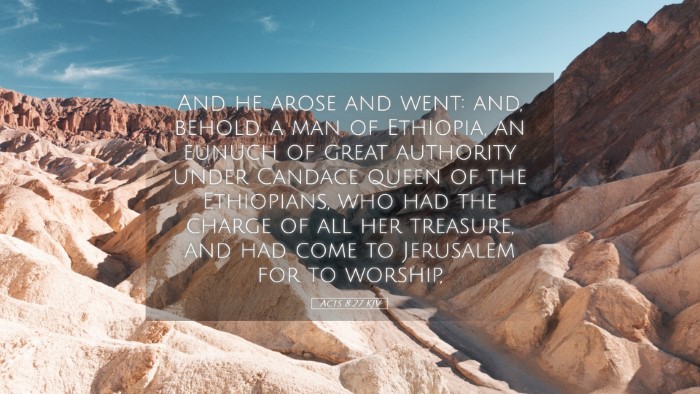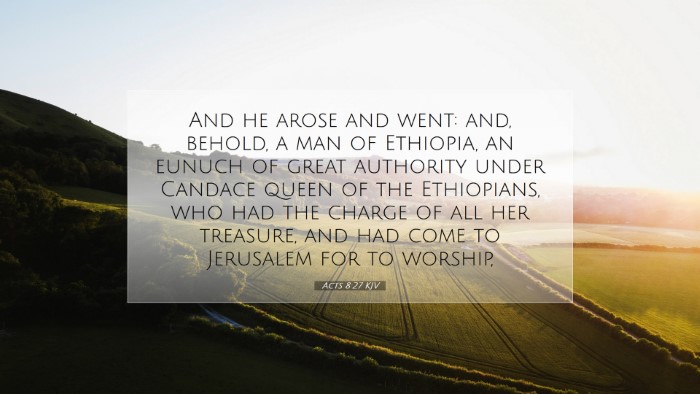Commentary on Acts 8:27
Bible Verse: "And he arose and went: and behold, a man of Ethiopia, an eunuch of great authority under Candace, queen of the Ethiopians, who had the charge of all her treasure, and had come to Jerusalem for to worship."
Introduction
The passage in Acts 8:27 introduces a significant encounter between Philip, one of the original deacons, and an Ethiopian eunuch. This event highlights the expansion of the Gospel beyond Jewish territory and illustrates God’s sovereignty in orchestrating the movement of His messengers and those who are to be saved.
Contextual Background
The early chapters of Acts detail the establishment of the Church and the sweeping spread of the Gospel, propelled by the Holy Spirit. Acts 8 is particularly pivotal as it marks the beginning of the Church’s mission to the Gentiles, underlining the unbounded reach of Christ's message.
Philip's Obedience
Matthew Henry: “Philip arose and went.” His immediate response to divine direction is a hallmark of faithful obedience. Unlike others who may hesitate, Philip’s willingness to embark on a journey without knowing its full direction showcases the necessity of faith in the Christian walk.
The Ethiopian Eunuch
The eunuch is described as a man of great authority. He served under Candace, a title used for the queen of Ethiopia, and was in charge of her treasury.
- Albert Barnes: “This man was a proselyte to the Jewish religion, traveling from Ethiopia to Jerusalem to worship. His high position indicates that he was a seeker of truth, suggesting that even those in power recognize their spiritual needs.”
- Adam Clarke: “The term ‘eunuch’ signifies a man who has been castrated, a condition often seen in royal courts in antiquity. This detail emphasizes not only his physical status but also his standing within society, providing a bridge for discussion on the inclusivity of the Gospel.”
The Significance of the Journey
The eunuch’s journey to Jerusalem underscores a yearning for spiritual understanding. Despite his high position, he felt the need for worship and truth—a striking reminder that earthly authority does not equate to spiritual fulfillment.
Worship in Jerusalem
Matthew Henry: “The eunuch’s pilgrimage to Jerusalem signifies his deep desire to connect with God. This act reflects an important principle that true worship often involves seeking God beyond one’s immediate environment.”
Theological Insights
This passage reveals several theological themes relevant to Christian doctrine and practice:
- God’s Sovereignty: The orchestration of events leading Philip to the eunuch demonstrates God’s control over the spread of the Gospel, fulfilling His promise that the message would reach all nations.
- Inclusivity of the Gospel: The encounter illustrates a key theme in Acts—the widening scope of the Gospel, extending even to individuals from distant lands and varied social standings.
- Seekers of Truth: The eunuch, despite his high status, exhibits a profound spiritual hunger. This challenges the notion that societal status correlates with spiritual sufficiency.
Lessons for Modern Readers
Many lessons can be drawn from Acts 8:27 for contemporary believers:
- Responsive Obedience: Like Philip, believers are called to respond immediately to the leading of the Holy Spirit, even when the path ahead is unclear.
- Being Open to the Unexpected: Just as Philip encountered an unexpected divine appointment, Christians today must remain vigilant for opportunities to share their faith with those God brings into their lives.
- Recognizing Seekers: The presence of seekers in various societal roles challenges the Church to actively engage with people from all walks of life, fostering relationships that lead to spiritual conversations.
Conclusion
Acts 8:27 serves as a vital link in understanding the early Church’s mission to reach the Gentiles and highlights the importance of obedience, the pursuit of worship, and the inclusivity of God’s message of salvation. Ultimately, it lays a foundation for the Church’s ongoing mission to seek and save the lost, reinforcing the notion that no one is outside the reach of God’s grace.


